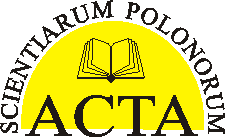Title
THE EFFECT OF IODINE BIOFORTIFICATION ON SELECTED BIOLOGICAL QUALITY PARAMETERS OF LETTUCE AND RADISH SEEDLINGS
Autor
Anna Krzepiłko, Iwona Zych-Wężyk, Jolanta Molas, Barbara Skwaryło-Bednarz, Agata Święciło, Monika Skowrońska
Keywords
iodine – enriched vegetables, potassium iodide, sprouts
Abstract
Iodine deficiency disorders are one of the serious worldwide public health problem in the world. The need to search for alternative methods of iodine supplementation results from the recommendation of the World Heath Organization and aims to significantly reduce iodine malnutrition in humans diet. Iodine is not included among essentials nutrients for plants, but the plants are able to accumulate it. Seedlings biofortified with iodine can become an alternative source of this element for humans. The aim of the study was to attempt to obtain iodine-fortified lettuce and radish seedlings and to determine the effect of the level of iodine applied in the form of potassium iodide on their biological quality. The following levels of KI were used: 0 (control), 0.075, 0.15, 0.0375, 0.75 and 1.5 mg per Petri dishes. The effect of potassium iodide on the selected parameters of their biological quality varied depending on the KI doses and species of plant. The seedlings grown in the presence of KI had a higher iodine content. The results showed that the most appropriate biofortification application rates were 0.075 and 0.15 mg because the enriched seedlings had biological quality parameters similar to the control. Statistically significant differences in the parameters characterizing seedling quality were noted most often in the case of the highest amounts of KI (0.375–1.5 mg). These KI concentrations reduced seedling’s lenght in radish and lettuce seedling but increased dry weight only in lettuce. A significant increase in ascorbic acid concentration only in the lettuce seedlings was obtained. In comparison with the control, no significant differences in the content of biomass and chlorophyll content were noted in the biofortified seedlings. Thiol group content was decreased in both radish and lettuce, but the antioxidant activity measured by DPPH method only in lettuce seedling extracts.
Pages
3-16
Cite
Krzepiłko, A., Zych-Wężyk, I., Molas, J., Skwaryło-Bednarz, B., Święciło, A., Skowrońska, M. (2016). THE EFFECT OF IODINE BIOFORTIFICATION ON SELECTED BIOLOGICAL QUALITY PARAMETERS OF LETTUCE AND RADISH SEEDLINGS. Acta Sci. Pol. Hortorum Cultus, 15(3), 3-16.
Full text


